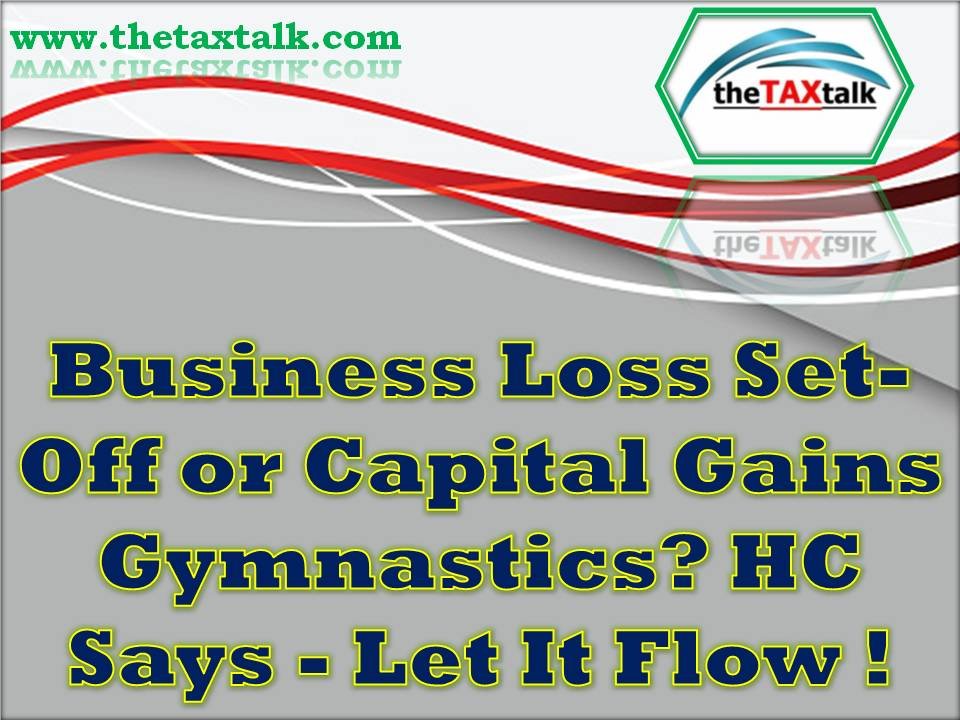![]()
Business Loss Set-Off or Capital Gains Gymnastics? HC Says – Let It Flow !
Taxation has its fair share of comedy – not because of what the Income Tax Department does, but because of what it thinks taxpayers should not do. In a recent drama that unfolded like a courtroom sitcom, the Madras High Court passed a landmark judgment in Bojaraj Textile Mills Ltd. v. ACIT (2025) 176 taxmann.com 48, restoring justice to what can be best described as a “head-of-income mismatch scandal.”
The Plot
Here’s the twist in the tale: the assessee, Bojaraj Textile Mills Ltd., sold depreciable assets – buildings, machinery, etc. – and earned what the law calls “short-term capital gains under Section 50”. However, they tried to set off this gain against their brought forward business losses under Section 72.
Now, any CA or seasoned taxpayer would say, “That’s logic, not magic.” But the Assessing Officer said, “Wait! This is capital gains, not business income.” And boom! Set-off denied.
The Legal Tug-of-War
The case went through multiple tax authorities like a contestant on a reality show trying to impress every judge. The Tribunal sided with the Revenue. But Bojaraj didn’t give up – they appealed to the Madras High Court. And guess what? Justice finally wore her tax spectacles.
In a dramatic yet scholarly ruling, the High Court held:
“If it walks like business income, quacks like business income, and was born out of business assets – it is business income!”
The Court emphasized that Section 50 may deem such profits as capital gains for the purpose of computation, but in substance, the profit is just the business income dressed up in capital gain’s formal suit.
The Real Hero: Substance Over Form
The High Court quoted the Bombay HC ruling in CIT v. Galiakot Containers Pvt. Ltd., where similar facts existed. The bottom line: Depreciable business assets, when sold, yield capital gains under a deeming fiction. But that doesn’t change their character – they’re still proceeds from business assets, and the profit is essentially a recovery of past depreciation.
So, dear readers, if your business losses from earlier years are sitting idle like a forgotten FD, you might just have a way to put them to work if you’ve earned gains from selling old business machinery.
Tax Lesson for the Curious Taxpayer
Let’s simplify this for the average taxpayer who thinks Section 50 is a cricket score:
Suppose you had a business loss in 2020-21 and parked it safely in your ITR. Fast forward to 2024-25, and you sell your old factory equipment for a gain. The Income Tax Act says this is “capital gains.” But is it? Not really, says the High Court – it’s more like your business income showing up in capital gains disguise, perhaps on Halloween.
And since Section 72 allows business losses to be set off against profits from business, you’re good to go!
A Word of Caution
Let’s not go too far and start matching every gain with a convenient past loss. The HC ruling doesn’t give a free pass to match apples with oranges. The gain must be tied to business assets, and the loss must be business-related. Try mixing speculative losses or long-term gains, and you’ll hear the dreaded word: “disallowance.”
Also, let’s remember – tax law is about both the spirit and the letter. Courts, increasingly, are interpreting tax provisions in line with commercial reality and business sense, not just by blindly following heads of income.
Funny But True
A taxpayer once said, “My income is under the head ‘capital gains’, but my losses have no head to claim from!” With judgments like these, at least now, your headless losses might finally find a match!
The Takeaway for Professionals
Always analyze the substance of a transaction, not just its head of income.
Don’t accept disallowances at face value – precedents like this can be powerful.
For tax planning, consider the set-off potential of carried-forward losses, especially when disposing of old business assets.
Final Words
This judgment isn’t just a win for Bojaraj Textile Mills – it’s a victory for common sense in tax law. And while we can’t promise all reassessments will have happy endings, at least now there’s hope that logic will prevail over label.
So next time someone tells you, “This is capital gain, you can’t set off business loss,” you can smile and say, “Let’s see what the Madras High Court has to say about that.”


